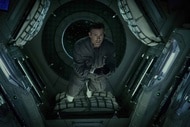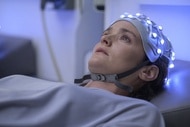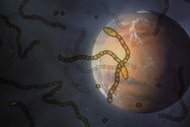Create a free profile to get unlimited access to exclusive videos, sweepstakes, and more!
Netflix's Away puts Hilary Swank in space jeopardy to give us hope here on Earth

In the pantheon of films and television shows with a space exploration premise, astronaut families are often relegated to either stressfully staring up at the stars or anxiously awaiting their loved ones' re-entry back on Earth. There’s been an overall dearth of stories, going back to 2001: A Space Odyssey through to The Martian, that are actively interested in showing how the explorer and their families back home navigate their time apart in tandem.
Netflix’s new drama, Away, attempts to fill that void by giving audiences the This Is Us meets The Martian mash-up we never knew we needed. Created by Andrew Hinderaker and showrun by Jessica Goldberg, Away is based on Esquire writer Chris Jones’ feature story on astronaut Scott Kelly's year-long mission in space. In the series, American astronaut Emma Green (Hilary Swank) commands an International group of astronauts and scientists on the first manned mission to Mars. As she and her crew embark on a three-year journey into the unknown, in parallel back on Earth we see the medical trials and tribulations of Green’s stroke-surviving husband, Matt (Josh Charles), and their teenage daughter growing up without her mom.
The series is meant to pull the heartstrings, warming up what can often be sterile, scientific storytelling when it comes to space-centric narratives. In fact, Hinderaker and Goldberg tell SYFY WIRE that Away’s intentional focus on interpersonal problem solving and resilience with those at home, and the crew hurtling into space, has surprisingly evolved into a productive aspirational blueprint for our divisive times.
Let’s start with the Esquire article: What aspect of it really ignited the premise of a series?
Andrew Hinderaker: There was a moment in the Esquire article that's following Scott Kelly’s time aboard the International Space Station and his sister-in-law, Gabbie Giffords, is shot. He's obviously not able to be there for his family during this incredibly traumatic time. And he's trying to figure out how to support them from this extraordinary distance. It's an incredibly powerful moment, but one that resonated really personally.
My partner, Eileen, and I have been together for 15 years. Shortly before [I read] the article, we had gone through this medical trauma where Eileen had been diagnosed with a really terrible, progressive disease. And it happened while I was away. I'm a playwright, so I was in Chicago opening a play. She basically called to wish me luck on opening night. I could tell something was wrong and then found out that this had been discovered and diagnosed. Eileen and I are often long-distance, as she's a professor at the University of Wisconsin, so supporting each other from a distance is a huge part of our lives. And so, really, that became the cornerstone around which I developed the show. And that's really why that [specific] event that launches the show, and the decision that Hilary’s character makes, that launches our series.
There’s also the show’s global story regarding the mission to Mars, right?
Hinderaker: Yes, Chris’ article also talks in beautiful detail about the International Space Station and this improbable alliance of a number of countries working together repurposing technologies often used for destruction for discovery. And so, that was a macro idea of what's possible when it's truly an international endeavor within this much more intimate story.
Jessica, as you came on after Andrew wrote the pilot script, what was your personal entry point into Away?
Jessica Goldberg: [Executive producer] Jason (Katims) and Andrew gave it to me, and there were two things that made me know that I had to work on this show. The first one was this character of Emma Green, who is a working mother. I had never seen that story articulated with that kind of complexity: a woman who loves her career as much as she loves her family. It just spoke to me. And then when we started writing the show, the world was divisive but not nearly as much as it is now. So, I love this fantasy of asking, "Wow, what if the world did get together and listen and work together towards exploration, towards achievement. What is that dream?" I just wanted to play in that hope for a while.
Audiences are pretty savvy about the science of space now. How did you approach the authenticity of portraying a credible mission to Mars within a series that isn’t trying to be a documentary?
Hinderaker: As soon as I started the project, I took a trip to Houston. I was very lucky that from the moment I began the project I had a direct line to Chris Jones, who wrote the article and has written so many beautiful articles about space. And through him, I had a lot of direct lines to folks at NASA. And so, that became a starting point for an enormous amount of research. Of course, space exploration is one of those subjects where you can do an enormous amount of research and just barely scratch the surface. But the research itself was really based in human experience because when I hopped off a plane in Houston, I got picked up by Don Pettit. He is an astronaut that's been to space a number of times. I met his wife, and got a chance to talk to both of them.
The first night I was in Houston, Micki [Pettit] was describing how it felt watching her husband on top of a rocket, knowing in a few minutes he's either gonna break through the atmosphere or the rocket is gonna explode. And how it's the most terrifying and exhilarating moment of your life. I bring that up because even the NASA research was still centered on the human experience and how that feels.
Goldberg: And we actually were lucky enough to go down to Johnson Space Center and spend a lot of time with people that are really planning Mars missions. So much of those discussions are in the show. And there's so much personal stuff from so many of our writers. A moment that's really moving to me was an astronaut telling us what they missed the most was the weather. We don't think about that. And right now, we're actually having this [pandemic] experience we never thought we’d experience, which is what is it to be isolated? But can you imagine not having sun or rain or trees? It's really wild to think about.
With The Martian, audiences practically get a course on growing bio-waste potatoes. How beholden did you feel about relaying accurate science, especially in the space portions of your story?
Hinderaker: You try your best to learn the science. What we tried to learn was the fundamentals of what could go wrong. I remember speaking with Terry Virts, a former astronaut, and asking if he would go to Mars. And he said, “Ehh, I don't know.” I asked him why. And he said, “Well, the water system would break down on the International Space Station a lot. We had a backup system, and even if that failed, we could always shoot back to earth. But that's not really an option going to Mars.” And so, I don't even pretend that all of our thermodynamics and water system malfunction storyline is gonna pass muster with every scientific measure. But the fundamentals of what happens for them was absolutely based on one of the principal things that could go wrong.
There’s a lot of strife between the mission crew members before they even take off. It’s very dramatic but is it realistic?
Hinderaker: One piece of advice that we got from chatting with astronauts that came up a number of times is that they're people just like everyone else that can have interpersonal conflicts. But sometimes the situation and the mission demands moving past them. So, we’re not trying to make them, as people, seem like they're transcendently heroic, but that the situation demands for them to transcend their pettiness. I spoke with an engineer who was involved in some of the early Russian-American collaborations and we talked about some of the challenges there. And that informed our show for sure. But at the end of the day, like you're saying, whether we're telling a story of the families on earth, whether we're telling a story between the crewmates in space or telling those stories between space and earth, you're really just trying to tap into human, messy relationships between people that, depending on the people and the relationship, involve this trust and love and fear and betrayal and all of those qualities.
Away really confronts the tricky terrain of professionals who choose to have to physcially separate from their families for their vocation. Is that personal for you as a showrunner?
Goldberg: Yes, as a showrunner, I never get to shoot in LA. I have never been able to shoot in my city. I'm a single mom. I have to go away, and that is a really complicated thing. But I love my work, and it's been really interesting with this show because it's the first show that my daughter can finally watch. And her pride, it's so rewarding. I think, for me, it was really starting with myself and my own emotions towards missing things, like missing a tooth that fell out. Obviously, this show is that situation amplified, but starting with the personal always seems to be the most honest way to go.
Hilary Swank embodies the push and pull of Emma’s ambition with her love of her family. How did she further impact how the story unfolded?
Goldberg: She came onto the show very early, right away. But first of all, Andrew, Jason, and I were like, “Who do you believe is an astronaut?” The training that you have to go through to be an astronaut is so mentally and physically rigorous. So, immediately, it's like, “Hilary Swank. She has that spirit. She has the soul.” And then, she brings the warmth, the love, the ferocity of being a parent to the screen. But she does her work so carefully. Her questions, when she brings them to you, are so well thought out. And they only raise the bar of what's on the page. Andrew and I, we just got so lucky with her as our Emma because together I feel like it's been a collaboration of just growing this character.
Season 1 of Away debuts on Netflix Sept. 4, 2020



























